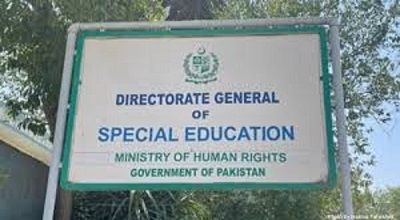Special Education in Pakistan
Special education in Pakistan refers to educational services. And programs designed to meet the unique needs of individuals with disabilities or special educational needs. These needs can include physical, intellectual, sensory, or behavioral disabilities. That may hinder a person’s ability to learn and participate in a regular classroom setting. The goal of special education in Pakistan, as in many other countries. Is to provide equal educational opportunities and support to students with disabilities. So they can reach their full potential and become active members of society.
Here are some key aspects of special education in Pakistan:
Inclusive Education: Pakistan has been making efforts to promote inclusive education. Where students with disabilities are included in regular classrooms alongside their non-disabled peers. This approach aims to reduce segregation and promote social integration.
Specialized Support: Special education programs in Pakistan may offer a range of specialized support services. Including individualized education plans (IEPs), speech therapy, occupational therapy, and assistive technology to help students with disabilities access the curriculum.
- Types of Disabilities: Special education in Pakistan covers a wide range of disabilities, including but not limited to, intellectual disabilities. Physical disabilities, sensory impairments (such as blindness or deafness), autism spectrum disorders, and learning disabilities.
- Special Schools: Pakistan also has special schools and institutions dedicated to providing education and training for students with specific disabilities. These schools often have teachers and staff with expertise in working with particular disabilities.
- Government Initiatives: The government of Pakistan, through its Ministry of Education and provincial education departments. Has introduced various policies and initiatives to improve access to quality special education. These efforts aim to ensure that children with disabilities have the same opportunities for education as their peers.
- Challenges: Despite progress, special education in Pakistan faces challenges such as a lack of qualified teachers. Insufficient resources, and social stigmatization of individuals with disabilities. These challenges can hinder the effective implementation of inclusive education.
It’s important to note the state of special education in Pakistan. For the most up-to-date information on special education in Pakistan. I recommend consulting the official websites of relevant government agencies and organizations dedicated to special education in the country.
Special Education Needs
Special Educational Needs (SEN), often referred to as Special Educational Needs and Disabilities (SEND). In some regions, is a term used to describe students. Who has particular learning or behavioral needs that require additional support and resources beyond? What is typically provided in a mainstream educational setting? SEN can encompass a wide range of conditions, disabilities, and learning differences. Here are some key points related to Special Educational Needs:
Diverse Range of Needs: SEN can cover a broad spectrum of needs, including but not limited to:
- Learning Disabilities: Such as dyslexia, dyscalculia, or specific learning difficulties.
- Communication Disorders: Including speech and language impairments.
- Physical Disabilities: Such as mobility issues or chronic health conditions.
- Sensory Impairments: Including blindness, deafness, or hearing impairments.
- Autism Spectrum Disorders (ASD): Such as autism or Asperger’s syndrome.
- Behavioral and Emotional Difficulties: Such as attention deficit hyperactivity disorder (ADHD) or conduct disorders.
- Inclusive Education: In many countries, the goal is to promote inclusive education. Where students with SEN are educated alongside their non-disabled peers in regular classrooms to the maximum extent possible. Inclusive education aims to create a supportive and accessible learning environment for all students.
- Individualized Education Plans (IEPs): One common approach to supporting students with SEN is the development of Individualized Education Plans (IEPs). These are personalized plans that outline the specific needs of the student and the strategies and accommodations. That will be provided to help them succeed academically and socially.
- Additional Support: Students with SEN often receive additional support and services, which can include special education teachers. Speech therapists, occupational therapists, or behavioral specialists. These professionals work with the students to address their unique needs.
More Needs
- Parent and Teacher Collaboration: Collaboration between parents, teachers, and support professionals is crucial in identifying. Addressing the needs of students with SEN. Regular communication. Collaboration helps ensure that the student’s educational plan is effective.
- Legal Protections: Many countries have legal frameworks and regulations in place to protect. The rights of students with SEN and ensure they receive appropriate educational services. These laws may vary from one region to another.
- Awareness and Advocacy: There is a growing awareness of the importance of recognizing and addressing SEN. Advocacy groups and organizations often work to raise awareness. Provide resources, and support families and educators in meeting the needs of these students.
- Ongoing Assessment: The progress of students with SEN is regularly assessed to determine. If the provided support and accommodations are effective. Adjustments to the educational plan may be made based on these assessments.
It’s important to note that the terminology and specific policies related to SEN can vary from one country or educational system to another. Laws and regulations governing special education and support services are typically designed to ensure. That all students have access to quality education and the opportunity to reach their full potential, regardless of their individual needs or disabilities.
